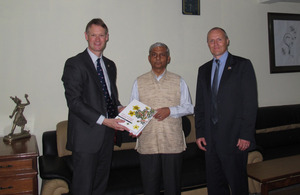Edinburgh botanists meet the President and Prime Minister of Nepal
Centred in the Himalayan Biodiversity Hotspot, Nepal has an estimated 7000 plant species - nearly 5 times that of the UK - yet the level of understanding of these natural resources is remarkably low.

Dr Mark Watson and Dr Colin Pendry meeting Prime Minister
Scientists from the Royal Botanic Garden Edinburgh met with the President of Nepal, Ram Baran Yadav, and Prime Minister Khil Raj Regmi, to discuss their research on the conservation and long term sustainable use of Nepal’s plant biodiversity. Mark Watson and Colin Pendry were visiting Nepal for the 5th International Editorial Meeting of the Flora of Nepal project, and have been involved in training a group of 40 young botanists during a 5-day capacity building workshop. The Flora of Nepal is a collaboration between the UK, Japan and Nepal, led by Mark at the Editorial centre in Edinburgh. The team is producing the first authoritative, definitive account of all plants in Nepal - a critical first step towards conservation and sustainable development.
Centred in the Himalayan Biodiversity Hotspot, Nepal has an estimated 7000 plant species - nearly 5 times that of the UK - yet the level of understanding of these natural resources is remarkably low. The first of 10 volumes of the Flora of Nepal was published in 2011, and a low-cost Nepalese edition has just been printed by the in-country partners: Nepal Academy of Science and Technology; Department of Plant Resources, Ministry of Forests and Soil Conservation; and Central Department of Botany, Tribhuvan University. This research underpins studies on medicinal plants and other natural resources essential to the livelihoods of rural communities, and provides baseline data for understanding the effects of climate change, healthy forest ecosystems and the environmental impact of development.
Mark Watson said: “There is an urgent need for the Flora as it is needed to safeguard Nepal’s rich plant and wildlife resources so that it is not lost to future generations. We are working with our partners in Nepal and internationally to accelerate this fundamental research and complete the Flora within seven years. The Flora contributes to the World Flora Online, a priority Biodiversity 2020 Target of the Convention on Biological Diversity’s Global Strategy for Plant Conservation, and we are seeking support from international and national donors and the private sector to achieve this goal.”
Both the President and Prime Minster recognised the importance of this work, especially in the face of increasing pressures on the environment from rapid development, a growing population and the unpredictable effects of climate change. They expressed interest in accelerating the completion of the Flora, and the integration with development projects in forestry, climate change and the sustainable use of plant resources. The British Ambassador, Andy Sparkes, joined Mark Watson for meetings with Minsters of concerned Government Ministries, and DFID officials.
The British Ambassador, Andy Sparkes, said: “An accurate and definitive account of Nepal’s rich flora -including hundreds of species unique to the country- will have many practical uses. Tracking incidence of the flora will help with the mapping and early warning of climate change effects. Better understanding the role of plants in the ecosystem and biodiversity will help ensure preservation of species needed for pollination and regeneration of economically valuable trees, fungi, fruits and herbs, and also for maintaining soil quality. This knowledge will also ensure that such factors are given due weight in environmental impact assessments for projects. Dr Watson will continue to have the Embassy’s full support as he seeks GEF and other funding for his valuable work, and I am glad that he has also had such encouragement and interest from Nepal’s leaders”.